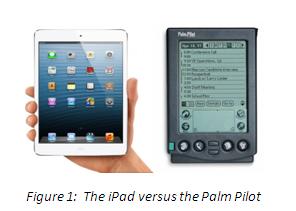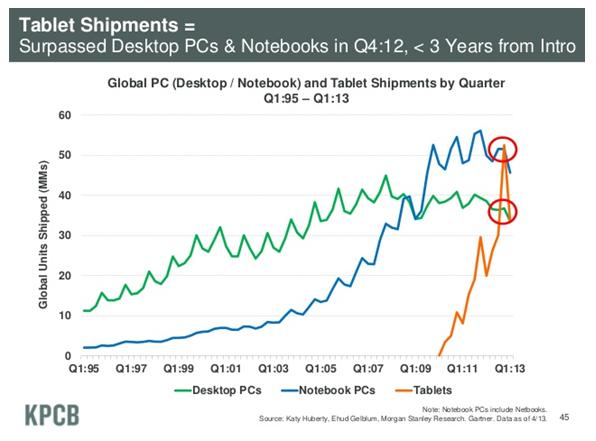Why the iPad Matters for Healthcare Industry

Ashish Khera takes a look into the rise of the iPad in pharmaceutical and healthcare sales and marketing. Is this tablet here to stay? Read on to find out...
"Whip," Walter echoed.
"So there's an iPhone app for fighting zombies. Interesting..."
— Amelia Beamer (The Loving Dead)
It has only been a decade since the masses embraced the ability to make a call from a device that could fit inside their pocket. As commonplace as the mobile phone feels nowadays, technology has rapidly evolved beyond instant portable voice, to ubiquitous data. Apple's iPad has disrupted both the mobile and computing industries by introducing a form factor that bridges the spectrum of computing power and portability. The iPad has exploded in popularity, with sales now in the millions. Besides being utilized for personal use and entertainment, the iPad has permeated businesses as well.
One of the sectors that has quickly adapted to the iPad is the healthcare industry, particularly the medical device and pharmaceutical industries. One cannot go to a medical conference today without seeing sales reps armed with iPads at the booths, ready to show customers the newest medical technologies with a swipe of a finger.
But is the iPad just a fad? Doomed for failure as the Palm Pilots of old?
Does the iPad matter? The answer is a resounding yes, and in fact, it is a promising long-term solution in the healthcare industry.
Adaptability:
At Apple's iPhone 5 event in September 2012, Apple CEO Tim Cook touted some pretty impressive numbers for the iPad: 84 million sold through June of 2012, with 94% of Fortune 500 companies adopting the iPad into their companies.
"As commonplace as the mobile phone feels nowadays, technology has rapidly evolved beyond instant portable voice, to ubiquitous data."
In Q1 of 2013, Tablet shipments surpassed Desktop / Notebook shipments for the first time.
Figure 2: In the first quarter of 2013, the number of tablet sales was higher than the sales of Desktop PCs.
An article by the Wall Street Journal discusses how the medical device industry in particular has taken to the iPad1:
"There appears to be something of an iPad arms race in the $200 billion medical-devices sector. Heart-device maker Boston Scientific recently bought 2,000 for its sales team, and Orthopedics company Zimmer Holdings Inc. is rolling out more than 1,000 of the tablets ... while Medtronic recently bought 4,500 iPads for its sales and marketing team, making it one of the iPad's biggest corporate buyers."
Why are medical device and pharmaceutical companies buying iPads by the busload? In a word: sales.
The sales advantage
Medical device and pharma companies extol the importance of their sales forces. They provide face time with customers that help drive product sales. On many occasions, marketing and sales representatives literally have only seconds to pitch their product to a busy doctor. Many medical device industry leaders I have spoken to throughout the years have joked about the literal nature of the proverbial "elevator" pitch. The iPad allows for innovative and engaging ways for reps to communicate product information to doctors, without having to worry about long boot times and wasted precious interaction moments.
A representative of Novartis states:
"... IPad use will save sales teams 250 hours a year allowing for 35,000 more customer visits."
According to the Manhattan Research Group's research on the advantages of iPad aided interactions with doctors and its relation to increased sales2:
"Why are medical device and pharmaceutical companies buying iPads by the busload? In a word: sales."
As the numbers indicate, the iPad is becoming a key sales force tool to promote physician interaction. In an interview with Apple, Linnea Burman, the Marketing Director for Drug Delivery Systems at Medtronic says the following of the iPad3:
"For field-based employees, iPad is an essential device. The battery lasts throughout the day, and the Multi-Touch screen gives us a better way to organize information. Whether they're presenting clinical articles or patient videos, the screen size on iPad is fantastic for our sales partners.... At the end of the sales call, they're able to email the appropriate material as they walk out the door, rather than wait until the end of the day."
Why are so many doctors more receptive to being pitched by an iPad wielding representative? One of the main reasons is increased levels of interactivity and user engagement.
Product engagement
The design of the iPad is simple and intuitive. Having only one physical button on the face of the device (the Home button) subconsciously invites the user's fingers to interact with the touchscreen interface. This makes navigating the interface and applications much easier and more fluid.
The physical restrictions of a keyboard and mouse have been replaced by intuitive and natural finger gestures. This has helped sales reps to tailor the experience. Relevant product information, charts, and graphs can be called on screen with the touch of a finger. Many companies are also building interactive apps and 3D medical animations on the iPad, highlighting the mechanisms of action for their product to further engage physicians:
"iPad helps us communicate with clinicians; it helps our stories come to life. The sales representative can pull up information quickly and use graphics to tell a story in a very memorable way."
Linnea Burman, Marketing Director, Drug Delivery Systems, Medtronic.
And, as mentioned, the iPad's mobility is another factor of why it has made a rapid impact on the industry.
"...the iPad is becoming a key sales force tool to promote physician interaction."
Information at your fingertips
The iPad's lightweight and form factor make it the sensible tool for the medical professional on the go. Instead of having to worry about lugging around and powering up a laptop to get to an important product presentation, a rep can quickly cue up the presentation with the touch of a finger almost instantly. Its long battery life also means the sales and marketing teams are able to relay information to its customers at any time:
Linnea Burman, Marketing Director, Drug Delivery Systems, Medtronic.
Conclusion
Not only does it seems that the iPad is here to stay for the foreseeable future, it aims to be the missing link in the ever challenging need for the medical device industry to connect with its customers. With its impressive interface and application possibilities, the iPad does indeed matter in today's healthcare industry. Given the unprecedented adoption and use, not being on the tablet bandwagon may actually put you at a competitive disadvantage!
References:
1) http://online.wsj.com/article/SB10001424052748703493504576007723119984758.html
2) http://healthandpharmainsight.tumblr.com/post/30881263957/epharma-physician-r-new-trends-for-2012
3) http://www.apple.com/ipad/business/profiles/medtronic/
About the author:
Ashish Khera is a bio-mechanical engineer from Carnegie Mellon university and having 15 years+ experience in fortune 500 medical device/ pharma industry, Mr. Khera is the co-founder of Scientific Animations, a premium medical animation studio catering worldwide animation needs.
Has the iPad revolutionised healthcare sales and marketing?













